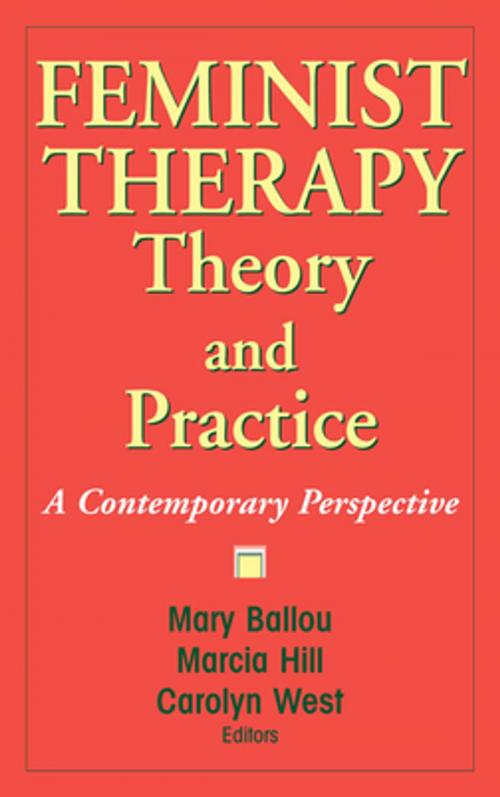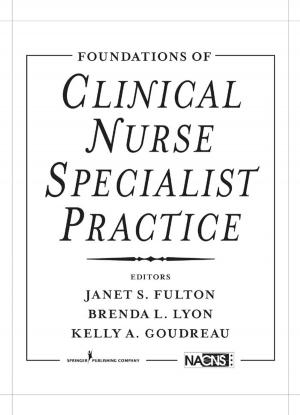Feminist Therapy Theory and Practice
A Contemporary Perspective
Nonfiction, Social & Cultural Studies, Social Science, Gender Studies, Feminism & Feminist Theory| Author: | ISBN: | 9780826119582 | |
| Publisher: | Springer Publishing Company | Publication: | December 26, 2007 |
| Imprint: | Springer Publishing Company | Language: | English |
| Author: | |
| ISBN: | 9780826119582 |
| Publisher: | Springer Publishing Company |
| Publication: | December 26, 2007 |
| Imprint: | Springer Publishing Company |
| Language: | English |
"In this latest volume to emerge from the work of the Feminist Therapy Institute, Ballou, Hill, West, and their contributors have done a powerful job of explicating current themes in feminist therapy practice, with a lovely balance of theory and application. The careful attention to the economic and social demands of the current political climate and their impact on feminist practice is particularly valuable for advancing feminist analysis of the role of psychotherapy in social transformation."
--Laura S. Brown, Ph.D. ABPP,
Director, Fremont Community Therapy Project
Seattle, WA
"In the twenty-plus years since the original Handbook of Feminist Therapy was published, members of the Feminist Therapy Institute and other forward-thinking professionals have continued to push and prod-both themselves and mainstream therapists-to examine the underpinnings of the psychotherapy endeavor. In this volume, the editors and contributors present an organized overview of the most up-to-date thinking about feminist therapy and draw attention to the alliance between feminist therapy and multicultural counseling, critical theory, and liberation psychology. Whereas most mainstream therapy models have progressed beyond a view of the therapist as an objective agent, they generally do not provide a model for understanding the therapist's and, for that matter, the client's beliefs, experiences, and world view. The contextual ecological feminist model explicated here articulates a means of examining the contextual and ecological elements of person's worlds.
"The authors of this volume have nicely illustrated feminist therapy's key tenets-to illuminate the multiple spheres of influence in clients' lives, to empower clients as well as ameliorate their distress, to appreciate the linkages among sociostructural, cultural and relational influences, and to work for social justice-in well-drawn theoretical explanations and carefully detailed case examples that bring us to the cutting edge of contemporary feminist therapy."
--Maryka Biaggio, PhD
Psychologist, Consultant, and Writer, Portland, Oregon
"In this latest volume to emerge from the work of the Feminist Therapy Institute, Ballou, Hill, West, and their contributors have done a powerful job of explicating current themes in feminist therapy practice, with a lovely balance of theory and application. The careful attention to the economic and social demands of the current political climate and their impact on feminist practice is particularly valuable for advancing feminist analysis of the role of psychotherapy in social transformation."
--Laura S. Brown, Ph.D. ABPP,
Director, Fremont Community Therapy Project
Seattle, WA
"In the twenty-plus years since the original Handbook of Feminist Therapy was published, members of the Feminist Therapy Institute and other forward-thinking professionals have continued to push and prod-both themselves and mainstream therapists-to examine the underpinnings of the psychotherapy endeavor. In this volume, the editors and contributors present an organized overview of the most up-to-date thinking about feminist therapy and draw attention to the alliance between feminist therapy and multicultural counseling, critical theory, and liberation psychology. Whereas most mainstream therapy models have progressed beyond a view of the therapist as an objective agent, they generally do not provide a model for understanding the therapist's and, for that matter, the client's beliefs, experiences, and world view. The contextual ecological feminist model explicated here articulates a means of examining the contextual and ecological elements of person's worlds.
"The authors of this volume have nicely illustrated feminist therapy's key tenets-to illuminate the multiple spheres of influence in clients' lives, to empower clients as well as ameliorate their distress, to appreciate the linkages among sociostructural, cultural and relational influences, and to work for social justice-in well-drawn theoretical explanations and carefully detailed case examples that bring us to the cutting edge of contemporary feminist therapy."
--Maryka Biaggio, PhD
Psychologist, Consultant, and Writer, Portland, Oregon















